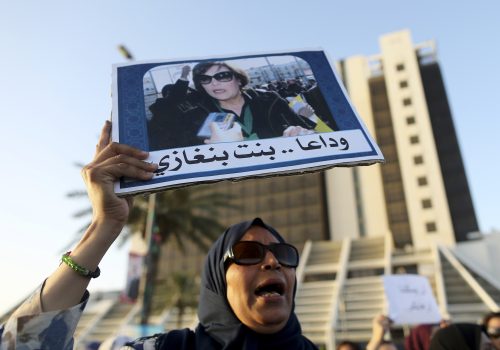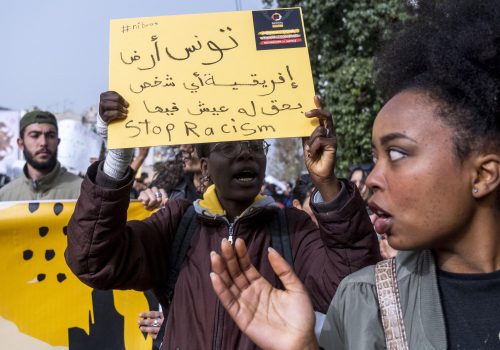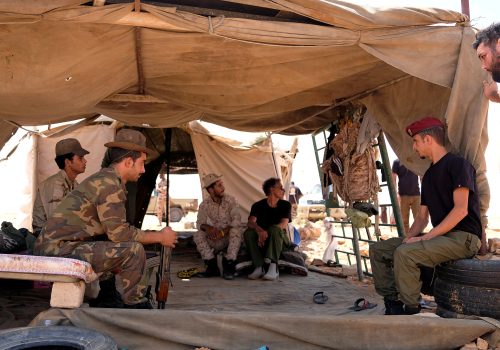Time to double down: ICC arrest warrants in Libya are a great start but Libyans deserve more
On May 11, International Criminal Court (ICC) Prosecutor Karim Khan announced new arrest warrants for crimes in Libya. They were made public during a regular briefing to the United Nations Security Council (UNSC), which referred Libya to the ICC in 2011 during the start of the country’s internal conflict.
Specifically, ICC judges approved four sealed arrest warrants and are deliberating over two more arrest warrant applications. Such news represents a surge in ICC activity in the country after relative dormancy, which has been largely caused by persistent violence between Tripoli, Benghazi, and their affiliates. While these ICC arrest warrants may be the accountability spark Libya desperately needs, the country’s culture of impunity will require more than arrest warrants from The Hague if it is to be uprooted.
What do the ICC arrest warrants mean?
As these new ICC arrest warrants are under seal, only relevant Office of the Prosecutor (OTP) staff and law enforcement partners know details, such as the identity of the accused. The OTP has, however, requested the unsealing of all arrest warrants and judges are considering that request. While not possible to glean identities for certain, there are some indications that the targets may be high profile.
By way of context, the ICC does not have its own police to enforce its orders, relying on cooperation from states—meaning the law enforcement agencies of the ICC’s 123 states parties and other countries willing to assist—like all international tribunals do. As such, international prosecutors use the element of surprise provided by sealed warrants, where they believe an arrest in the not-so-distant future is feasible. It is possible that arrests are in the making, with authorities in Tripoli or Benghazi willing to arrest foes that enter their controlled territory. Police in Tunisia, an ICC state party, may assist, given that many travel from Libya to Tunis for leisure, business, or medical purposes.
Yet, there are compelling reasons to believe the OTP is targeting senior individuals. To unseal arrest warrants often indicate a belief that an arrest cannot be executed anytime soon. Unsealing is done primarily to isolate and delegitimize more senior—and often more well-protected—targets through the pressure that public indictments can generate. Most importantly, the ICC has limited resources for each of the seventeen countries it is involved in, meaning it often must focus on the most senior and/or most responsible individuals to make the greatest impact with the smallest investment possible. Adding six cases to its existing one Libyan case—Saif al-Islam Gaddafi, the son of Libyan dictator Muammar Qaddafi—means it is unlikely the OTP will have the wherewithal to open additional cases. So, assuming these arrest warrants are all the ICC can muster for the foreseeable future, the odds are that at least some of the accused individuals are well-known figures in Libya.
Recommendations for policymakers
It is all too common for ICC arrest warrants to be interpreted as panaceas for larger societal ills or organic harbingers of change rather than as external attempts to foster positive change. These new warrants are no different and will not magically resolve the situation. To support these arrest warrants specifically and nurture their general catalytic effect, policymakers focused on Libya should consider the following recommendations.
The Ukraine-Russia conflict changed the global landscape across different sectors and international criminal justice is no exception. Antiquated US law on the ICC was overhauled significantly—including allowing the US government to support the ICC financially—and done so by strong bipartisan support. However, these changes were primarily limited to Ukraine. Both advocates on Capitol Hill and in the Biden administration should push for further amendments to US law to allow for Libyan victims to receive the same level of support as Ukrainian victims. This includes underwriting US in-kind support of ICC activities in Libya and providing grants for non-governmental organizations to support the work of the ICC and accountability writ large in Libya.
Separately, the mandate of the United Nation’s Independent Fact-Finding Mission on Libya (FFM) was not renewed and closed operations on March 31. Last summer, actors pushing for the FFM to continue until conditions change on the ground—most acutely the United States, European countries, and Libyan civil society—failed to come to an agreement with Libya and its African and Middle East allies, resulting in an unprecedented “non-renewable” mandate extension until the end of March 2023. Its closure means there are no independent, intragovernmental human rights entities carrying out investigative work in Libya at present. While it maintains jurisdiction and there are preliminary discussions of opening a field office, the ICC’s mandate and resources mean its focus will remain solely on mass criminality and on only a sliver of those involved.
By contrast, United Nations (UN) investigative bodies have broader mandates that include, for example, issues of state responsibility and a wide range of human rights violations—such as attacks on human rights defenders, women’s rights, and rights of minorities—that do not meet the threshold of, for instance, crimes against humanity. Khan and the OTP also publicly praised the FFM for the tangible support provided to its criminal investigation, most recently at the UNSC briefing.
UN investigative bodies like the FFM are the vanguard of interactions with and between affected communities and governments, vetting numerous kinds of allegations and providing the world with a full picture of what is truly happening in the country. For instance, despite several internal and external challenges, the FFM generated six well-received reports—including two optional longer ones—covering numerous categories of violations.
On top of losing such thorough reporting, the negative repercussions of the FFM’s closure are compounded by the fact that there was and remains zero justifications on the ground for its closure; to the contrary, all indicators of future violence and armed conflict are present. The reality is that geopolitics between the West and the Middle East and North African states led to its closure, not circumstances on the ground. Rectifying this error would reaffirm the international community’s commitment to positive change in Libya.
Another relatively recent development in international criminal justice has been the advent of UN investigative mechanisms, which are non-prosecutorial bodies that conduct their own investigations and act as a clearinghouse of evidence collection and analysis. Unlike the UN investigative bodies that have quite broad mandates that include non-criminal work, the primary purpose of these mechanisms is to build prosecution-ready casefiles for domestic and international jurisdictions that may have the power to prosecute atrocity crimes and human rights abuses. Temporary mechanisms have been created for Syria, Myanmar, and the Islamic State of Iraq and al-Sham’s (ISIS) crimes in Iraq.
Yet, momentum is building to evolve this concept, just like the temporary international tribunals for the former Yugoslavia and Rwanda led to the creation of the ICC. Calls to establish a global, standing investigative mechanism, with Libya as its first referral, have already been levied. Such a mechanism would not only enhance the global infrastructure on atrocity crimes accountability, but would also strengthen the prospects of justice across Libya by empowering both foreign courts with jurisdiction—e.g. European courts with authority over crimes committed in migration—and an international tribunal like the ICC, which relies on the support of such partners to augment their work.
One of the more striking findings by the FFM was that, unlike most other conflicts, Libyan judges and lawyers are trying to do their jobs in principled fashions. However, like most other conflicts, they experience significant repression from state and non-state actors. For example, the FFM interviewed many victims who had one or more judicial orders authorizing their release, which their captors ignored habitually, resulting in their brutal torture and detention in miserable conditions lasting for months, if not years. Additionally, judges and lawyers were regularly intimidated, punished, and/or subjected to violence for “unfavorable” judicial orders or for representing clients that authorities found undesirable. Policymakers should want to support these brave professionals through more robust rule of law projects in Libya, as well as through human rights defenders’ programs and advocacy campaigns.
Undoubtedly, these ICC arrest warrants are welcome developments. They help cement the importance of accountability in charting a better future for Libya and provide a glimmer of hope in a country currently possessing little of it. If well supported, these arrest warrants can serve as catalysts for the broader accountability and rule of law support needed across Libya. Yet, on their own, these arrest warrants will have a limited impact. If left unsupported, Libyan and international stakeholders will forsake this unique opportunity to change the culture of impunity that persists in the country’s East, West, and South. This must not be a case of another good opportunity in Libya going to waste.
Christopher “Kip” Hale has led investigations of atrocity crimes in conflict zones for the United Nations (UN) and a non-governmental organization, most recently as the Investigation Team Leader of the UN Independent Fact-Finding Mission on Libya. Follow him on Twitter: @kiphale.
Further reading
Thu, May 18, 2023
How the international community can help Libya’s political deadlock, according to local civil society actors
MENASource By
In this piece, three Libyan civil society representatives give their take on the international community’s role in Libya.
Mon, Mar 6, 2023
Afrocentrism is trending in the Maghreb. It’s because Sub-Saharan migrants are rewriting their narrative.
MENASource By Sarah Zaaimi
North Africa undoubtedly faces a serious migration problem that will continue to aggravate if not addressed regarding its social, cultural, and historical dimensions and root causes.
Tue, Feb 28, 2023
To counter the Wagner Group’s presence in Africa, the US will need to prioritize stabilizing Libya
MENASource By Emadeddin Badi
Quelling the Wagner Group's influence in Libya will be challenging, as the US must address Libyan realities and unite Europe and regional powers to support its foreign policy endeavor.
Image: A man holds a picture of commander Khalifa Haftar during Independence Day celebrations in Benghazi, Libya December 24, 2022. REUTERS/Esam Omran Al-Fetori


